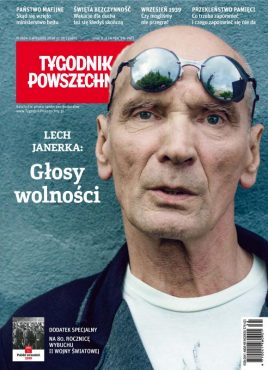CHURCH AND COMMUNICATION
The recent Bishops’ Council received favourable feedback on the spread of Christian-inspired newspapers. The weekly Gosc Niedzielny sells an average of 120,000 copies, well over the 90,000 copies of the “lay” review Polityka. Excellent sales also for another Catholic magazine, Tygodnik Powszechny. In the age of online information, the focus is on product quality, close relations with the local Church and support of parishes for wide-ranging dissemination

An sales increase of more than 3% of the Catholic weekly Gość Niedzielny (Sunday Visitor), in April 2019, compared to those of the previous year may appear to be a rather insignificant market success were it not referred to print media. With more and more readers turning to the Internet for information and abandoning newsstands, coupled with an overall decline in sales of newspapers and magazines in Europe, this is a significant result, considered exceptional by some. Another Catholic weekly, Tygodnik Powszechny, recorded an equally significant increase in sales (over 3%) in Poland.
 Fact-finding, unbiased reporting. “Despite the world-wide decline in the circulation of printed media – said Fr Adam Pawlaszczyk (in the large photo), editor-in-chief of Gość Niedzielny since February 2018 – the real crisis stems from the decline of journalism as a profession of public confidence, based on scrupulous verification of the facts, seeking the truth with unbiased reporting. Nowadays, he remarked, “the work of journalists is often replaced by that of marketing specialists, with outcomes that fail to attract readers’ trust. Gość Niedzielny is
Fact-finding, unbiased reporting. “Despite the world-wide decline in the circulation of printed media – said Fr Adam Pawlaszczyk (in the large photo), editor-in-chief of Gość Niedzielny since February 2018 – the real crisis stems from the decline of journalism as a profession of public confidence, based on scrupulous verification of the facts, seeking the truth with unbiased reporting. Nowadays, he remarked, “the work of journalists is often replaced by that of marketing specialists, with outcomes that fail to attract readers’ trust. Gość Niedzielny is
“a Europe-wide phenomenon: I know of no other Catholic weekly magazine ranking first among national opinion weeklies on a regular basis”,
said Fr Adam Pawlaszczyk during the latest Council of diocesan Polish bishops whilst presenting the figures on the first six months of 2019 with an average of almost 120,000 copies sold, while the most popular, structurally a-religious Polish weekly Polityka sold just over 90,000 copies.
News reports and in-depth analysis. The latest issue of “Gość Niedzielny”, dated 1 September, is primarily dedicated to education, as 2 September marked the beginning of the school year in Poland. The issue does not fail to cover the 80th anniversary of the Second World War along with an interesting survey on young Poles aged between 17 and 24 who “don’ t trust politicians”, and prefer the opponents of the current government, but consider a well-off and relaxed life more important than public activity. They want comforts, professional gratification – reads the article – and the possibility to enjoy their free time in a relaxed way; they are focused on how to improve their own future without worrying about the needs of others, while the State should provide well-paid jobs, low taxes and efficient schooling system. In the first September issue, Gosc features an article on the tragedy in the Tatra mountains, where two adults and two children died in a thunderstorm while a hundred or so tourists were left injured, and an interview with Italian 95-year-old Emma Morosini who went on a pilgrimage to Jasna Góra, along with directions to devote one hour a day to the Guard of Honour to the Sacred Heart of Jesus.
Monthly publication for children. The editorial staff of Gość is composed of 135 people from all over Poland and a large number of full-time or occasional collaborators who enrich each issue with their contributions, sometimes dedicated to strictly topical issues and, in other cases, to other broader issues.
The first issue of the magazine was published on September 9, 1923. Compared to its initial 8 pages, today Gość consists of 76 pages.
In addition, besides 20 diocesan 8-page supplements, every issue includes a 16-page TV insert. The weekly is completed by a monthly magazine supplement for young readers, Mały Gość Niedzielny, whose annual sales total over half a million copies. Both magazines are published by Instytut Gość Media, which is also the owner of the news portal www.wiara.pl with the support of the Gość Niedzielny Foundation, which aims to “develop and promote Christian culture in the awareness that a false image of man, regardless of his religious dimension, is the main cause of cultural decadence.”
 The support of parishes. Speaking at the Bishops’ Council, Fr Adam Pawlaszczyk pointed out that Gość long-standing top-ranking is also a result of the publication’s distribution in parishes, as it offers pastoral assistance to priests. “But today we need a greater commitment from priests; without it, the Catholic press would disappear from the market”, observed the priest-journalist, stressing that 78% of sales of Gość takes place through its 8,500 parishes in 26 dioceses throughout the territory of Poland, while only 19% through traditional retail networks.
The support of parishes. Speaking at the Bishops’ Council, Fr Adam Pawlaszczyk pointed out that Gość long-standing top-ranking is also a result of the publication’s distribution in parishes, as it offers pastoral assistance to priests. “But today we need a greater commitment from priests; without it, the Catholic press would disappear from the market”, observed the priest-journalist, stressing that 78% of sales of Gość takes place through its 8,500 parishes in 26 dioceses throughout the territory of Poland, while only 19% through traditional retail networks.
Universal language. The other Catholic weekly, Tygodnik Powszechny, which, as confirmed by the Polish Institute for Press Control, is the opinion weekly with the fastest growth since 2013, selling almost 1.4 million copies over the last year (July 2018 – June 2019), is distributed exclusively through newsstands sales.
“We seek to be the voice of the Church of Pope Francis and present the faith and the Church in Poland and the world with a universal language”
 above “party and political divisions, free of the drama intended to stir up an emotional response”, Paweł Bravo (in the photo), director of the local news desk, told SIR. The magazine is primarily directed at readers over-20 who live in towns with more than 50,000 inhabitants.
above “party and political divisions, free of the drama intended to stir up an emotional response”, Paweł Bravo (in the photo), director of the local news desk, told SIR. The magazine is primarily directed at readers over-20 who live in towns with more than 50,000 inhabitants.